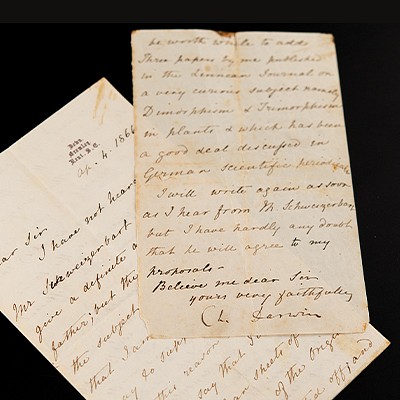Marquis de Lafayette Autograph Letter Signed to Justice Story, Praising America's Social and Political Institutions
Two ways to bid:
- Leave a max absentee bid and the platform will bid on your behalf up to your maximum bid during the live auction.
- Bid live during the auction and your bids will be submitted real-time to the auctioneer.
Bid Increments
| Price | Bid Increment |
|---|---|
| $0 | $5 |
| $50 | $10 |
| $200 | $25 |
| $500 | $50 |
About Auction
Apr 17, 2024
With nearly 900 lots up for auction, RR Auction's April Fine Autographs and Artifacts sale focuses on historic material from the 19th and 20th centuries. Among the highlights are a rare check signed by Abraham Lincoln; a significant Leon Trotsky publishing contract; important scientific letters by Albert Einstein and Charles Darwin; several remarkable naval manuscripts; and a historic letter by Martin Luther King, Jr. on the integration of higher education. RR Auction support@rrauction.com
- Lot Description
ALS signed “Lafayette,” one page, 7.75 x 10, May 28, 1827. Handwritten letter to Joseph Story, an associate justice of the United States Supreme Court. In full: "I am happy in every opportunity to remind you of a friend who feels himself under most pleasing obligations to you. This letter will be delivered by Mr. Guillet, formerly a Secretaire Interprite to the Department of Foreign Affairs, a scientific gentleman who is going to visit the U.S. with a view to collect informations and probably to publish them. He has requested me to send to him at New York these introductory lines. I am pleased whenever learned and well meaning Europeans visit the U.S. because they cannot but be struck with admiration for the state of the country in every respect and for the institutions to which all political, social, and personal blessings are so eminently to be attributed. Present my affectionate respects around you, to family and friends, namely to my old companion in arms Mr. Pickering." Addressed on the integral leaf to "Honble. Judge Story, Salem, Massachusetts, favored by Mr. Guillet." In fine condition, with seal-related paper loss to the integral address leaf.
Revered in the United States as a hero of the Revolutionary War, the Marquis de Lafayette had made a triumphant return to the United States in 1824 at the invitation of Congress and President James Monroe. He toured all 24 states in the union and was met with a rapturous reception at every stop. On Lafayette's visit to Salem, Massachusetts, on August 31, 1824, native son Joseph Story—a noted legal author and associate justice of the Supreme Court—addressed the esteemed guest, praising his character and accomplishments: 'You have been not merely the friend of America, but that of France, and of Liberty throughout the World. During a long life in the most trying scenes, you have done no act for which virtue need blush or humanity weep. Your private character has not cast a shade on your public honors. In the palaces of Paris and the dungeons of Olmutz, in the splendor of power, and the gloom of banishment, you have been the friend of justice, and the asserter of the rights of man. Under every misfortune, you have never deserted your principles. What earthly prince can afford consolation like this? The favor of princes and the applause of senates, sink into absolute nothingness, in comparison with the approving conscience of a life devoted to the good of mankind.'
When Isidore Guillet, formerly an interpreter for the French Ministry of Foreign Affairs, decided to visit America in 1826 to conduct research for a book, he reached out to Lafayette for introductions to distinguished Americans—among them Supreme Court justice Joseph Story, Harvard professor George Ticknor, and Congressman Stephen Longfellow, the father of poet Henry Wadsworth Longfellow. Like Lafayette, Guillet hoped that France would follow the American example and become a democracy. In this fascinating letter, Lafayette fulfills his friend's request and reveals his broad sense that the American Revolution—and the freedoms it established—have resulted in social, political, and personal happiness. - Shipping Info
-
Bidder is liable for shipping and handling and providing accurate information as to shipping or delivery locations and arranging for such. RR Auction is unable to combine purchases from other auctions or affiliates into one package for shipping purposes. Lots won will be shipped in a commercially reasonable time after payment in good funds for the merchandise and the shipping fees are received or credit extended, except when third-party shipment occurs. Bidder agrees that service and handling charges related to shipping items which are not pre-paid may be charged to a credit card on file with RR Auction. Successful international Bidders shall provide written shipping instructions, including specified Customs declarations, to RR Auction for any lots to be delivered outside of the United States. NOTE: Declaration value shall be the item’(s) hammer price and RR Auction shall use the correct harmonized code for the lot. Domestic Bidders on lots designated for third-party shipment must designate the common carrier, accept risk of loss, and prepay shipping costs.
-
- Buyer's Premium



 EUR
EUR CAD
CAD AUD
AUD GBP
GBP MXN
MXN HKD
HKD CNY
CNY MYR
MYR SEK
SEK SGD
SGD CHF
CHF THB
THB





